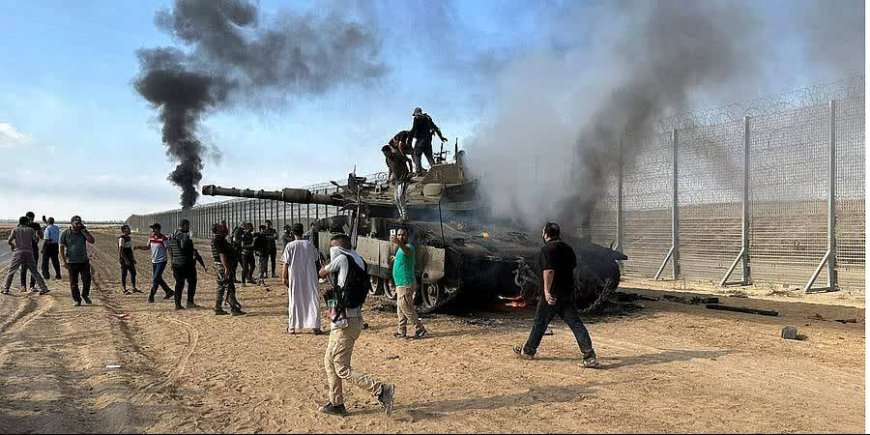Game Over: Does Operation Al-Aqsa Spell a Geostrategic Fiasco for Israel?
Yom Kippur, the holiest day in the Jewish calendar, holds significant historical relevance as it marks the commemoration of the Yom Kippur War in 1973. This conflict, jointly orchestrated by Syria and Egypt, aimed to reclaim the Golan Heights and Sinai Peninsula, which had been occupied by Israel during the Six Day War in 1967. The outcome of the Yom Kippur War dealt a decisive blow to the Zionist regime. However, in later years, the unity among Arab nations over the Palestinian cause was undermined by the plots concocted by the United States and the Zionist regime.

Recently, the Operation Al-Aqsa Storm, reminiscent of the events of 1973, unfolded once again on Yom al-Kippur, catching the Zionist regime off guard. Evidence reveals that Hamas and the Axis of Resistance launched a meticulously devised plan, strategically capitalizing on the element of surprise. Simultaneously launching ground, air, and sea attacks, the Palestinian resistance forces swiftly liberated two Israeli military bases and several illegal Zionist settlements near the Gaza Strip. This unprecedented military feat has garnered admiration from supporters of the Palestinian cause and instilled fear and astonishment in the Zionist enemies and their Western supporters.
The catalyst for the Operation Al-Aqsa Storm can be traced back to the Islamic Unity Conference held in Tehran two weeks prior. During the event, attendees had the opportunity to meet with Imam Sayyed Ali Khamenei, the Islamic Republic of Iran’s Supreme Leader. Imam Khamenei characterized the Zionist regime as a focal point of animosity and hostility against the entire Islamic nations. He stated, "Their goal was to form an illegitimate state from the Nile to the Euphrates," emphasizing that this sinister goal has yet to materialize due to the resistance encountered from countries such as Egypt, Syria, Iraq, and others. Imam Khamenei's remarks shed light on the deep-seated animosity by the Zionist regime, aligning with the verses expressed in the Holy Qur'an: “‘Die in your rage! Allah has knowledge of what is in your chests.' (3: 119)"
Furthermore, Imam Khamenei addressed the issue of normalizing relations with the Zionist regime, cautioning against Arab governments that view this as a successful foreign policy. His Eminence emphasized that such a course of action would lead to strategic caroches and ultimately result in the loss of the Palestinian cause. These governments, Imam Khamenei warned, are betting on a losing horse, and it is imperative not to fall into this trap. The Supreme Leader of Iran's statements served as a scathing critique of the Arab regimes seeking to establish relations with Tel Aviv, while simultaneously inspiring the forces of the Axis of Resistance to undertake precise, methodical, and successful operations.
Hamas, undoubtedly, had a long-term plan in place for the Operation Al-Aqsa Storm, as evidenced by Netanyahu's admission that the intelligence and security apparatuses of the Zionist regime were easily fooled by the Palestinian group prior to this operation. This revelation underscores the gravity of the crisis facing the Zionist regime.
In essence, the Operation Al-Aqsa Storm operation marks the third strategic fiasco for the Zionist regime in its encounters with the resistance front. Within the first three hours of this matchless and unprecedented operation, Palestinian troops successfully captured 35 Israeli soldiers. Despite strict Israeli censorship, reports indicate a significant number of Israeli military casualties, surpassing those of the 33-day war. Currently, the Palestinian resistance forces have gained control of almost the entire border of the Gaza Strip. Additionally, several military bases, such as the Kerem Shalom Kibbutz and border crossing, have fallen into the hands of the Palestinian resistance forces. This strategic development highlights the resistance's ability to confront and withstand Israeli elite forces who are armed to the teeth.
The Zionist regime, with the aid of its Western supporters, aims to portray itself as the victim in this latest round of connotation, hoping to garner global sympathy. However, let us not forget that the Al-Aqsa Storm operation serves as a response to decades of atrocities committed against hundreds of thousands of Palestinian civilians, women, and children by Zionist settlers and soldiers. Only since 2008, 150,000 Palestinians have been murdered, including 33,000 children. Thus, to avenge these years of occupation and heinous crimes, multiple operations similar to the Al-Aqsa Storm are deemed necessary by the Palestinian resistance.
In a delayed reaction to the extensive operations conducted by the Palestinian resistance forces in the occupied territories, Israeli Prime Minister Netanyahu declared that Israel has entered a real war and claimed that it will emerge victorious. During a meeting with Israeli commanders, Netanyahu outlined three objectives: eliminating the threat posed by infiltrating Palestinians in occupied territories and settlements, inflicting heavy losses on Hamas in the Gaza Strip, and preventing third parties, such as Hezbollah, from entering the war.
Netanyahu's goals underscore the dire and critical circumstances faced by Tel Aviv today, stripping its leaders of decision-making power and management capabilities, as confusion and disorientation are evident in their aimless attacks on Gaza. On the other hand, Israelis are desperately aware that the involvement of a third party would result in a swift and resounding defeat. Furthermore, numerous reports indicate internal schisms within Israel regarding war management, with Lapid and Gantz questioning Netanyahu's ability to navigate these challenging circumstances. They have proposed the formation of a national emergency cabinet. However, it remains uncertain whether Netanyahu's acceptance or rejection of this proposal would impact the regime's fate. With the formation of a National Emergency Cabinet, the intensity of attacks on the Gaza Strip may escalate, prompting Hezbollah and other resistance groups to come to the aid of Hamas. This would prolong the war, exacerbate the Israeli regime's domestic crises, and pose challenges for its primary supporter, the United States, which currently faces internal turmoil and constraints preventing it from fully supporting its Middle-Eastern mad dog.













































